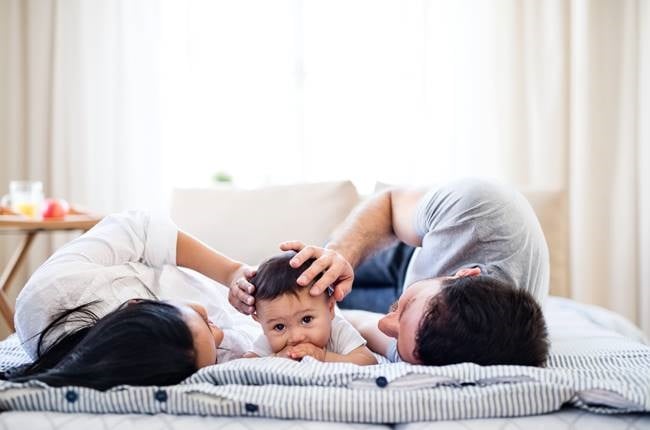
We know it takes a village to raise a child, and that in a perfect world two parents are better than one, but now a study has proven that parenting together is such a natural phenomenon that a couple who works together to care for children can actually alter each other’s brain activity.
A study led by researchers are Nanyang Technological University in Singapore (NTU Singapore) has revealed how the brain activity of 24 husband and wife pairs from Singapore changed in response to recordings of infant stimuli such as crying, when they were physically together and when they were separated.
They found that when spouses were physically together, they showed higher similarities in brain responses to the stimuli than when they were separated.
This effect was only found in true couples and not in randomly matched study participants.
The area of the brain the researchers monitored is the prefrontal cortex, which is associated with complex behaviour and emotional states.
Undermine the quality of parental care
The senior author of the study, NTU Associate Professor Gianluca Esposito, said the study indicates that when spouses are physically together, there is greater synchrony in their attentional and cognitive control mechanisms when parenting.
When similar brain activity in the same area of the brain is observed in two people, it suggests that both are highly attuned to each other’s emotions and behaviours.
"Since the brain response of parents may be shaped by the presence of the spouse," he said, "then it is likely that spouses who do not spend much time together while attending their children may find it harder to understand each other’s viewpoint and have reduced ability to coordinate co-parenting responsibilities. This may undermine the quality of parental care in the long run."
He added that spending more time together while attending a child may seem a waste of time, but it could actually help the couple with parenting.
Tune into each other’s behaviour and emotions
He explained how the finding is particularly useful for parents who are working from home during this "circuit breaker" period - as families spend more time together at home as part of social distancing measures in the fight against Covid-19.
"The entire family interacting together for an extended period may be stressful," he said, "but parents can take this time to tune into each other’s behaviour and emotions while caring for their children."
How the study was done
The researchers used a non-invasive optical imaging technique called functional Near-infrared Spectroscopy (fNIRS) to measure the participants brain signals, based on the level of oxygenated and deoxygenated blood in the brain.
Prior to the experiment, couples answered a questionnaire that aims to measure how often the mother or father takes the lead in co-parenting.
The couples were then exposed to infant and adult laughter and cries, as well as a static sound either together (in the same room at the same time) or separately (in different rooms at different times).
Co-parenting requires active teamwork
The NTU research team compared the couple’s brain activity to calculate brain-to-brain synchrony and found that couples showed a greater degree of synchrony when they were together than separated.
The findings of this study may be empowering for those who experience parenting stress, the paper’s co-first author Ms Mengyu Lim added, in that parents should not think of parenting as an individual task, but a shared responsibility with the spouse.
"Co-parenting requires active teamwork, communication, and trust in each other," she said.
Chat back:
Share your story with Parent24. Anonymous contributions are welcome.
Email: Share your story with us via email at chatback @ parent24.com




 Publications
Publications
 Partners
Partners











